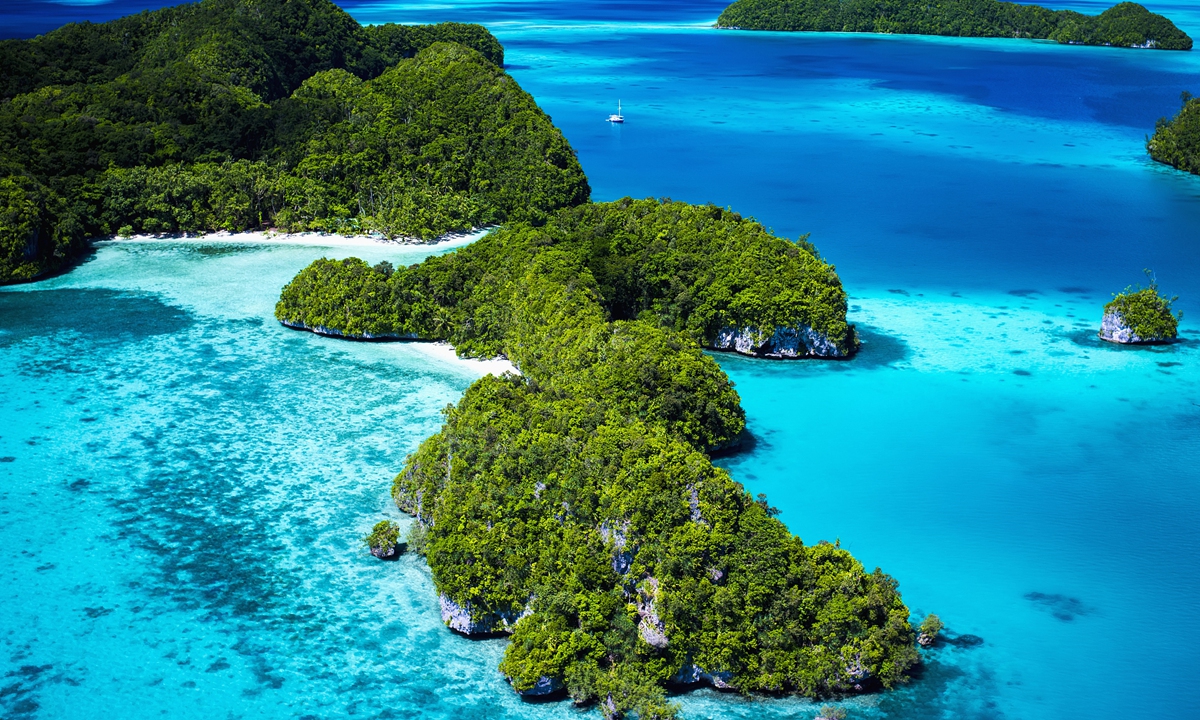Palau cannot afford being geopolitical strategic pawn in US’ encirclement on China

Landscape of Palau. Photo: VCG
Earlier this month, Surangel Whipps Jr., president of Palau, a Pacific island country, visited the US. On August 5, he met with US Secretary of Defense Lloyd Austin. Austin thanked Whipps for "Palau's willingness to host US forces" and appreciated the opportunity to "deploy equipment to Palau that lets us [the two nations] exercise in our joint capabilities and enhanced deterrence."Meanwhile, on Saturday, US media outlet VOA Chinese quoted analysts saying that China is eager to break through the first island chain, and its long-range missiles can reach Guam directly. They believed this threatens the security of the Indo-Pacific region as well as the continental US, therefore, US troops will most likely enter and be stationed in second island chain countries such as Palau to disperse risks.
Palau lies in the southwest corner of Micronesia in the Western Pacific Ocean. It has great strategic value. After the World War II, the US assumed the administration of Palau in 1947. In 1982, Palau signed a Compact of Free Association with the US, and a special political relationship between the two was formed. Under the Compact, the US remains responsible for Palau's defense until 2044. At the same time, the US has exclusive and unlimited access to Palau's land and waterways for strategic purposes.
In recent years, this tiny island with a land area of 459 square kilometers has once again attracted the strong interest of its "suzerain." Although he did not directly invite the US military to set up a base in Palau during his visit to the US, Whipps welcomed more US military activities there and praised the US military's presence as "deterrence" in Palau and the Pacific islands as a whole.
Since Joe Biden took office, the US has continued to use all means to contain and encircle China in an all-round and multidimensional manner, including using the first and second island chains. However, after decades of development, China's reform and opening-up continues to deepen, and its economic development has made rapid progress. The conspiracy of some countries to choke and block China through multiple island chains has long collapsed in all-around way.
It should be admitted that until the end of the last century, China's strategic forces such as the navy, air force and rocket force still fell short of some military powers. The hegemonic country often deploys aircraft carriers in surrounding waters or straits around China, and China used to lack effective weapons and means to deter or strike them. China unveiled its DF-16 short-range ballistic missile for the first time at a military parade in 2015. It greatly encouraged the morale of the Chinese people and also gave a great shock to the world's hegemonic power. It is fair to say that the days when some countries could rely on aircraft carriers to act arbitrarily in surrounding waters around China are gone forever.
In order to continue seeking hegemony, the US carrier strike group and amphibious assault ship strike group have adopted two main strategies: One is to change tactics. The second is to pull the carrier strike group and amphibious assault ship strike group as far as possible out of the range of our short-, medium- and long-range ballistic missiles. The US is not daring to take risks. And they have retreated further and further, finally eyeing at Palau, the southernmost island in the second island chain and, in effect, a vassal state of the US. Forty years after the declaration of its "independence," Palau has not yet achieved a true sense of independence.
Palau is one of only 15 remaining countries with "diplomatic relations" with the island of Taiwan. As a tourist destination with beautiful sights, Palau will not be able to withstand the turbulence of geopolitics if it is determined to be tied to the "anti-China" and "Taiwan independence" chariots led by the US and the island's Democratic Progressive Party authorities, or turn its beautiful port into a base for the US military's pursuit of hegemony.
The author is a Beijing-based military expert. opinion@globaltimes.com.cn
